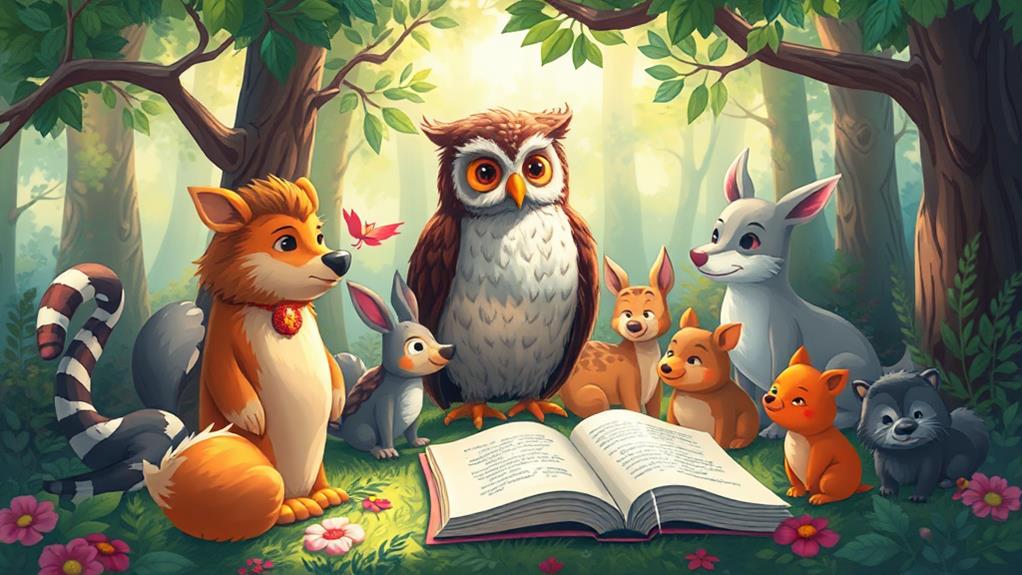You might not realize just how impactful short moral stories can be for a child's development. These narratives, steeped in timeless wisdom, offer more than mere entertainment; they serve as essential tools for instilling values like honesty, kindness, and perseverance. As you explore various categories and notable tales, you'll uncover unique ways to engage young minds and foster a deeper understanding of the world around them. What's even more intriguing is the transformative power these stories hold, but there's a lot more to uncover about their lasting effects.
Significance of Moral Stories

Have you ever wondered why moral stories are so impactful for children? These tales do more than just entertain; they teach important life lessons in a fun and engaging way. Through stories, kids learn about honesty, kindness, and empathy. When they read about characters facing challenges, they discover how to navigate their own feelings and interactions.
Moral stories also spark creativity! They stimulate children's imagination, allowing them to visualize complex ideas while enjoying the narrative.
Plus, these stories can greatly enhance language skills. As kids dive into new vocabulary and sentence structures, their communication abilities improve without them even realizing it.
Another wonderful benefit is cultural awareness. By exploring stories from different backgrounds, children learn to appreciate diversity and develop a broader worldview.
This helps build emotional intelligence, as they learn to understand different perspectives and feelings.
Categories of Moral Lessons
Moral stories come in various categories, each offering unique lessons that resonate with children. One popular theme is honesty, like in "The Boy Who Cried Wolf." It teaches the importance of truthfulness and how lying can break trust.
Responsibility is another key lesson found in stories like "The Ant and the Grasshopper," where hard work and preparation pay off in the end. You'll also find kindness emphasized in tales such as "The Lion and the Mouse," showing that even small acts of kindness can lead to big friendships and help when you least expect it.
Then there's perseverance, evident in fables like "The Tortoise and the Hare." It reminds you that sticking to your goals and putting in consistent effort can outshine natural talent any day.
Also, some stories explore the consequences of greed, teaching you that wanting too much can lead to losing everything instead of gaining more.
Notable Short Moral Stories

Notable short moral stories provide valuable lessons that resonate with children and adults alike. Take The Boy Who Cried Wolf, for example. It teaches you about honesty and how lying can destroy trust, leading to serious trouble when you really need help.
Then there's The Ant and the Grasshopper, which highlights the importance of hard work and preparation. The ants save up for winter while the grasshopper plays around, and guess who's left out in the cold?
You'll love The Lion and the Mouse, too! It shows how even the smallest acts of kindness can lead to surprising rewards, proving that everyone has value.
And let's not forget The Tortoise and the Hare. This tale emphasizes perseverance and humility, reminding you that slow and steady can win the race against overconfidence.
Lastly, The Golden Goose warns us about greed. It teaches that wanting too much too quickly can cost you valuable resources and relationships.
Each of these stories packs a punch, offering lessons on honesty, hard work, kindness, and more, shaping your character in ways you mightn't even realize. So, which story will you share next?
Tips for Engaging Storytelling
Storytelling can be a magical experience, especially when you engage children in a lively and interactive way. To make your storytelling unforgettable, use varied vocal tones and character voices. It's amazing how a silly voice can keep kids giggling and glued to the story!
Incorporate props or visual aids related to the moral stories you tell. These create a multisensory experience that helps captivate young audiences and boosts their understanding.
Additionally, don't forget to pause periodically to ask open-ended questions. This promotes critical thinking and encourages children to share their thoughts and predictions, keeping them involved.
Creating a cozy environment is key, too. Find a spot that's inviting and free from distractions. You want the kids to focus fully on the tale!
Choose stories with familiar themes and relatable characters, as this helps children connect personally with the lessons. They'll find the moral messages much more impactful when they see themselves in the characters' shoes.
Benefits of Reading Moral Stories

Reading moral stories offers a wealth of benefits that can significantly enrich a child's development. These tales aren't just fun; they stimulate your imagination and creativity, enhancing cognitive development and problem-solving skills.
When you dive into these narratives, you meet characters facing relatable challenges, helping you grasp complex ideas like empathy, honesty, and responsibility.
You'll also boost your language skills! As you encounter new vocabulary and learn to express your thoughts and feelings, your comprehension grows stronger.
Plus, moral stories expose you to diverse perspectives, fostering cultural awareness and appreciation for different values and experiences.
But that's not all! Listening to and discussing these stories promotes emotional intelligence. You get to explore various emotions, make connections with characters, and develop empathy towards others.
It's like training your heart and mind at the same time!

